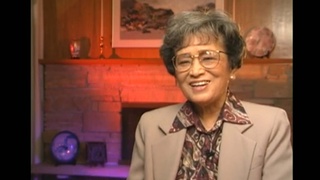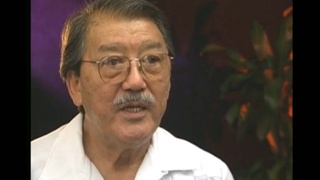Interviews
Redress clash between Senators Inouye and Hayakawa
In the summer of 1979, I got a call from Senator Inouye. He said I could get this Senate bill passed without Hayakawa’s help, but if the Congress knew that there was a Japanese American who was opposed to redress, that would be a tremendous benefit to the opposition. He said that people who knew nothing about Japanese Americans would vote against it, because Hayakawa’s voting against it. And he said that what we need to do is either to neutralize Hayakawa, [so] that he would not say anything against it, or to have him on our side. So he said, we want to talk to him, and could you make an arranged meeting for us. To make it easier for Hayakawa to say yes, tell him we will meet in his office.
So on August 1, 1979, 2:30 P.M., we had an appointment to meet in Hayakawa’s office. So we all went there. When we got there, Senator Inouye said that both Mineta and Matsui would not be there because, he said, we’re going to be talking about the Senate bill and they’re not in the Senate, so, therefore, they want to be excused and that was okay.
And as we were waiting in the room, the front door opened and two camera crews came in, and they walked right into the office. I could see Senator Inouye’s face just drop. He was very angry at the time.
Date: July 1-2, 1998
Location: California, US
Interviewer: Mitchell Maki, Darcie Iki
Contributed by: Watase Media Arts Center, Japanese American National Museum
Explore More Videos

The political effects on Nikkei during the war (Spanish)
(b. 1950) Nisei Chilean, Businessman


Need for Monetary Compensation
(1923–2008) One of the leaders behind the redress movement.

Erasing the Bitterness
(1923–2008) One of the leaders behind the redress movement.



Figuring out a dollar amount for redress
Judge, only Japanese American to serve on CWRIC.

On hearing of CWRIC selection from Senator Inouye
Judge, only Japanese American to serve on CWRIC.

Rationale for rejecting redress payment
Judge, only Japanese American to serve on CWRIC.

“No more shikataganai”
(1916-2010) draft resister, helped form the Heart Mountain Fair Play Committee

The Nikkei community that didn't support Former President Fujimori's election (Japanese)
(b. 1948) Executive Director of Amano Museum

The differences in attitude of pre-war and post war in terms of the President Fujimori presidency (Japanese)
(b. 1948) Executive Director of Amano Museum

The lawsuit set the standard for restoring people’s rights
(1927-2010) Political Activist

Beginnings of CWRIC
(b. 1931) U.S. Former Secretary of Transportation

